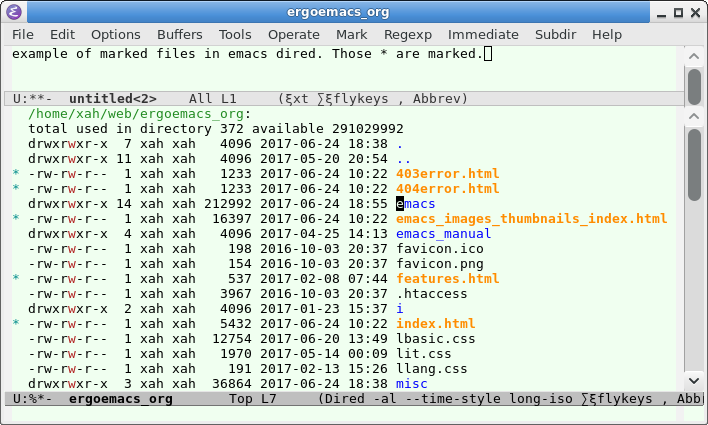

Then you can navigate to the selected search hits: C-RET or C-mouse-2 to visit, or cycle/visit using C-down. Use Q to start a query-replace-regexp session on the marked files. Mark all files in the resulting Dired buffer using t. If you want to go to the next occurence of sometext, just press C-s again (and so on for the next occurences). To search for sometext after the location of your cursor ( search-forward) hit C-s sometext. The replace commands normally operate on the text from point to the end of the buffer. In addition to the simple M-x replace-string command, there is M- ( query-replace ), which presents each occurrence of the search pattern and asks you whether to replace it. You can hit M-SPC to combine multiple such patterns. You can use this command to perform search/replace operations on multiple files by following the following steps: Assemble a list of files you want to operate on with either find-dired, find-name-dired or find-grep-dired. In Emacs, basic search tool ( I-Search) allows you to search after or before the location of your cursor. Emacs provides several commands for performing search-and-replace operations. * means search each line.Īfter you define the search contexts you type some text in the minibuffer, and it narrows the candidate search contexts to those that match your text. These commands let you specify a regexp to define the search contexts: the parts of the files or buffers that you want to search. Command icicle-search does both: files with a negative prefix arg, buffers with a non-negative prefix arg.If Emacs is still searching, C-g cancels only the part not done. I'm not aware of any tool that interactively previews replacements but there are several tools that allow you to interactively build the regular expressions used to do search and replace: Emacs comes with re-builder. Use C-s or C-r again to repeat the search in either direction.


And M-x icicle-locate-file does the same thing for all files under a given directory. The same is true for other Icicles file commands, including those that let you match an absolute file name, meaning that your minibuffer patterns can match not just the non-directory part of the file name but directory parts as well.įor example, C-x C-f with a prefix arg matches absolute file names. You can act on all files whose names match your current input - e.g., visit them all. visit) multiple candidates, selectively (e.g. That means that when you complete to a set of file names: A shared link will be deleted if it has been passive for almost 3 months.In Icicles, C-x C-f is by default a multi-command. Just click Share Button and it will create a short link, which can be shared through Email, WhatsApp or even through Social Media.
#Emacs find and replace code
You can use this feature to share your Python3 Code with your teachers, classmates and colleagues. So before you save a project, please create a login Id using a link given at the top right corner of this page. To save a project you will need to create a login Id with us. You can save your Python3 Project with us so that you can access this project later on. So simply run a program and provide your program input (if any) from the terminal window available in the right side. Emacs allows users to perform a query replace searching for a string and replacing. The latest version of Coding Ground allows to provide program input at run time from the termnial window exactly the same way as you run your program at your own computer. Emacs also provides users with several commands to replace text in a file. This development environment provides you version Python v3.6.2. Online Python Compiler (Interpreter) (Python v3.6.2) helps you to Edit, Run and Share your Python3 Code directly from your browser. Online Python Compiler (Interpreter) (Python v3.6.2)


 0 kommentar(er)
0 kommentar(er)
